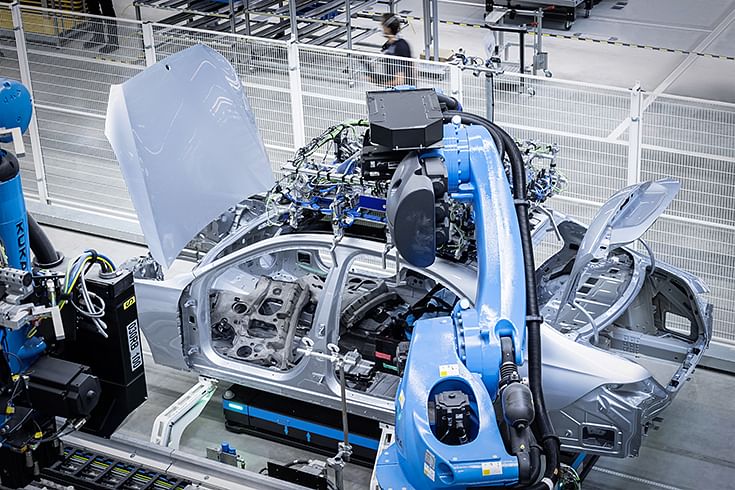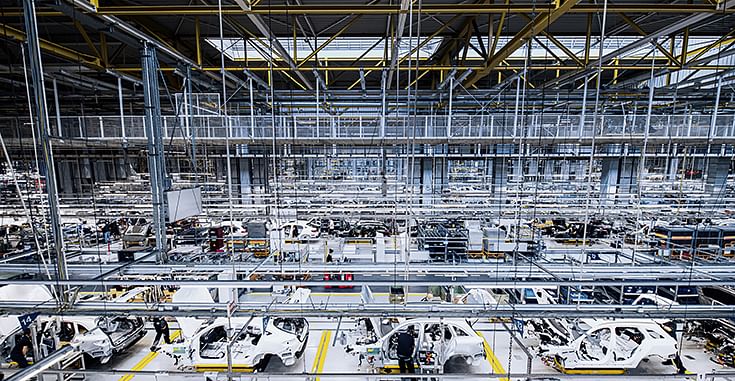Mercedes-Benz to source 50,000 tonnes of almost CO₂-free steel from Swedish start-up
New annual supply agreement with H2 Green Steel enables Mercedes-Benz to bring almost CO₂-free steel into series production in line with its plans to decarbonise its steel supply chain with partners worldwide.
Swedish start-up H2 Green Steel (H2GS) is to supply approximately 50,000 tonnes of almost CO₂-free steel per year, to be launched in various Mercedes-Benz vehicle models
The German luxury carmaker has signed a supply agreement with H2GS for supply of almost CO₂-free steel per year for its European press shops and deepened its partnership through a Memorandum of Understanding (MoU) with the aim to establish a sustainable steel supply chain in North America.
After taking an equity stake in H2GS in 2021, the new supply agreement enables Mercedes-Benz to bring almost CO₂-free steel into series production. The partner plans to start its production during 2025.
 Mercedes-Benz plans to decarbonise its steel supply chain with various partners worldwide.
Mercedes-Benz plans to decarbonise its steel supply chain with various partners worldwide.
As part of a broader effort to decarbonise the supply chain, Mercedes-Benz and H2GS agreed to aim to establish a supply chain for green steel produced in North America for local Mercedes-Benz manufacturing plants. Extending the strategic partnership with H2GS to North America marks another important milestone in increasingly pursuing the strategy of procuring close to Mercedes-Benz production sites.
“With the supply deal of around 50,000 tonnes almost CO₂-free steel from H2 Green Steel for our manufacturing plants in Europe, Mercedes-Benz and H2 Green Steel are accelerating the creation of a decarbonised, regional and resilient steel supply chain. At the same time, we are taking our partnership to the next level with the aim of establishing a sustainable steel supply chain in North America, another important step towards making the auto industry more resilient and sustainable,” said Markus Schafer, Member of the Board of Management of Mercedes-Benz Group AG, and Chief Technology Officer, Development & Procurement.
Dr. Gunnar Guthenke, Head of Procurement and Supplier Quality, Mercedes-Benz Cars, commented: “Together with our strategic partner H2 Green Steel, we’ve achieved the next milestone of our local for local strategy in procurement. Based on our initial investment into H2 Green Steel we now have a finalised relevant supply agreement for Europe and are looking at establishing a sustainable steel supply with H2 Green Steel in North America.”
Almost CO₂ free manufacturing technology
By using a new, innovate manufacturing process, the production of steel at the H2GS production site is almost CO₂-free. By contrast, steel produced using a classic blast furnace, emits an average of more than two tons of CO₂ per ton. In the new process, the supplier uses hydrogen and electricity from 100% renewable energy sources instead of coking coal in steel production. The hydrogen serves as a reduction gas, which releases and binds the oxygen from the iron ore. Unlike the use of coking coal, this does not produce CO₂, but water vapour. H2GS aims to achieve a footprint of 0.4t CO₂ per ton of steel at start of supply.
“H2 Green Steel exists because pioneering companies in the automotive industry, like Mercedes-Benz, signalled the transition in the steel industry was too slow for them to meet their climate targets. Working side-by-side with Mercedes Benz, we have a partner with whom we can raise the bar when it comes to supply chain emissions, circularity and social sustainability. They are a very strong player to liaise with for our European operations, but naturally also as we endeavour into the steel value chain in North America,” said Henrik Henriksson, CEO, H2 Green Steel.
 To achieve its climate goals, Mercedes-Benz is retooling its supply chain to focus on prevention and reduction of CO₂ emissions rather than off-setting.
To achieve its climate goals, Mercedes-Benz is retooling its supply chain to focus on prevention and reduction of CO₂ emissions rather than off-setting.
Decarbonising the supply chain
Mercedes-Benz is working with all its suppliers towards a net-carbon neutral supply chain from 2039 at the latest. To achieve its ambitious climate goals, the luxury carmaker is retooling its supply chain to focus on the prevention and reduction of CO₂ emissions rather than off-setting.
Already today, the brand with the three-pointed star has introduced low-CO₂ steel, made from scrap, into four series models. This allows CO₂ emissions for the respective steel grades to be cut by more than 60%. Moreover, Mercedes-Benz recently announced to bring aluminium with almost 70% CO₂-reduction compared with the European average into series production as the lightweight material is becoming increasingly important for electric vehicles. At the same time, Mercedes-Benz aims to increase the share of secondary raw materials in its passenger car fleet to an average of 40%.
RELATED ARTICLES
Autoliv Plans JV for Advanced Safety Electronics With China’s HSAE
The new joint venture, which is to be located strategically near Shanghai and close to several existing Autoliv sites in...
JLR to Restart Production Over a Month After September Hacking
Manufacturing operations at the Tata Group-owned British luxury car and SUV manufacturer were shut down following a cybe...
BYD UK Sales Jump 880% in September to 11,271 units
Sales record sets the UK apart as the largest international market for BYD outside of China for the first time. The Seal...






 By Autocar Professional Bureau
By Autocar Professional Bureau
 08 Jun 2023
08 Jun 2023
 4607 Views
4607 Views














 Ajit Dalvi
Ajit Dalvi




